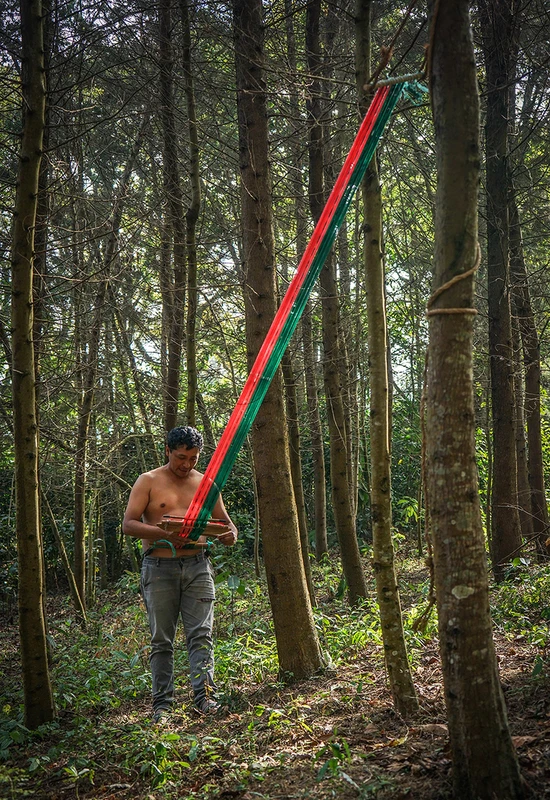Antonio Pichillá: In front of the lake
29 Sep-25 Nov 2023
PV 28 Sep 2023, 6-8pm


Elizabeth Xi Bauer Gallery, London, is pleased to announce Antonio Pichillá’s first solo exhibition in Europe. This exhibition closely follows Inherited Threads, at Tate Modern, a new collection display of works by North and Latin American artists that were recently acquired by the institution, as well as Antonio Pichillá Quiacaín: Tejiendo El Paisaje, a video installation at the Museum of Contemporary Art Santa Barbara.
For the exhibition opening this September at Elizabeth Xi Bauer, Pichillá will experiment with ways of hanging and displaying his works, including: hanging them from the ceiling; video installation; as well as utilising found objects from nature and alongside those that are man-made. As well as works created in his studio positioned near Lake Atitlán, Pichillá will spend time creating works for this upcoming exhibition in Elizabeth Xi Bauer’s artist studio, located next to the Deptford gallery.
The exhibition title is inspired by how central the water of Lake Atitlán is to life for Pichillá’s village in Guatemala. Its positioning in Mayan cosmology is that of a grandmother, who gives food, takes care of others, amongst another grandmotherly analogies. The artist's studio is beside Lake Atitlán, therefore it is no surprise that it is a source of great inspiration, not least with his Grandmother series of works. He is influenced by the rich history of textile making by the women of Guatemala, namely his mother who is a weaver. The exhibition and its title reflect the importance of this element as a source of life and energy to the artist, Guatemala, and humanity.
Antonio Pichillá focuses on the ever-developing connections between western contemporary art and the vernacular tradition of craft. Using natural materials Pichillá draws from Mayan epistemology to: “Restlessly look for a bond that integrate(s) with the environment as something inexact, uncodified. I struggle to give form to transitory states”.
Examining the ancient culture of his native Tz’utujil heritage and the postcolonial notion of a homogenous national identity, Pichillá’s works are an act of resistance to otherness and binary constructions of identity. Instead, his work celebrates the heterogeneity of everyday contemporary Tz’utujil life. From his studio at Lake Atitlán the artist's practice is driven by anthropological research into Guatemala’s urban and rural regions. Pichillá is interested in the relationship between found natural objects, such as rocks and branches and his textile works, as well as man-made objects.
Later this year, Pichillá will launch a publication which explores his artistic practice to date as well as seminal works from his career. The publication includes an introduction by curator Alexia Tala; writings from curator Cecilia Fajardo Hill; anthropologist Maria Jacinta Xon; as well as an interview with the artist conducted by Pablo José Ramírez, a Curator at the Hammer Museum Curator and former Adjunct Curator of First Nations and Indigenous Art at Tate Modern.
Occurring in 2023 is the 22nd Biennial of Sesc_Videobrasil – Memory is an Editing Station. The 40-Year Special will feature works by Antonio Pichillá. Taking place at Sesc 24 de Maio, São Paulo, Brazil, from 18th October 2023 – 25th February 2024, the biennial is curated by Raphael Fonseca, from Brazil, and Renée Akitelek Mboya, from Kenya. As well as exhibiting artworks at Sesc_Videobrasil, Antonio Pichillá will participate in a biennial talk on 21st October, entitled Land, Rights and Indigenous Technologies. The talk is moderated by Amanda Carneiroa and participating speakers include Pamela Cevallos, Brook Andrew, and Amanda Carneiro.
Antonio Pichillá’s work is also currently on display at Museo Reina Sofia, Madrid, Spain. Communicating Vessels, which runs until the end of 2023, is an exhibition of the museum’s permanent collection which has been organised into episodes of varying interdisciplinary approaches and narratives, with artworks featured spanning from 1881 to the present day.
Antonio Pichillá press release
Download